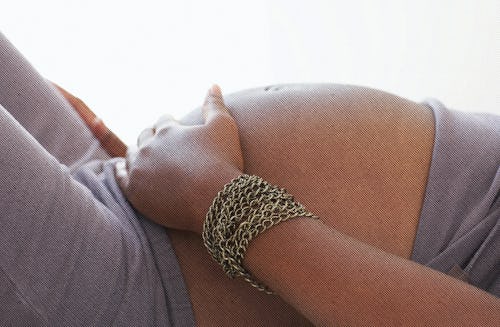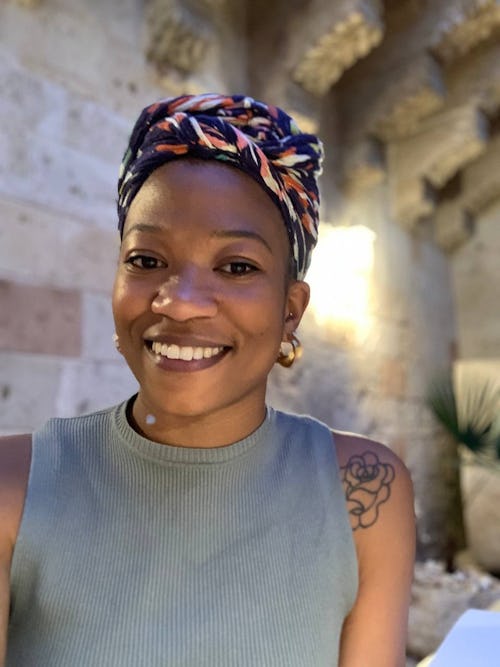
As the threat of the overturning of Roe V. Wade looms, many of us have been thinking hard about our and our loved ones’ rights and wellbeing. Part of that is honoring a person’s right to seek support both when they decide to have a baby and when they decide not to.
For Black women, this era is a particularly fraught one when considering autonomy and respect. When Black Americans do decide to have babies, they often do so at their own risk. Black women live with the highest rates of death and risk and face persistent racism and misogyny from within the medical system. According to the CDC, “Black women are three times more likely to die from a pregnancy-related cause than White women. Multiple factors contribute to these disparities, such as variation in quality healthcare, underlying chronic conditions, structural racism, and implicit bias.” Celebrities such as Beyoncé and Serena Williams have all spoken out about the mistreatment they survived giving birth that nearly took their lives.
And when they decide to have abortions, the resistance to their decision is often racist. For that reason and others, it is imperative that those trained and invested in providing emotional and somatic support to people seeking abortions — known as abortion doulas or abortion companions — become a resource to those who need them. Birthing people and the networks that support them have existed for decades before us. Why shouldn’t the same support be available for Black women who opt out?
Abortion doulas, first off, can help combat the stigma and shame surrounding abortion access. After that, their responsibilities run the gamut, but mostly involve supporting a person who has decided to terminate a pregnancy for whatever reason. “Doula work is liberation work. You have to be someone who is willing to stand between the person that you’re assisting and the world because the world will have assumptions about that person who’s getting the abortion, and they’ll have assumptions about abortion laws and what abortion means and what it isn’t.” says Ka’Lyn Coghill, in a recent Mic article on how doula work is critical in the midst of many life transitions. Even in the wake of catastrophe, many Black doulas are looking to the work ahead to support their clients regardless of the supreme court ruling.
Zachi Brewster, a U.K.-based abortion doula spoke to me about why her and her peers’ work is more necessary than ever before. “We are providing space for people to have their experiences even though the abortion experience can hold so much stigma, even though there are so many limits to access and care,” she says. While Brewster works abroad, her sentiment is relevant globally right now. The state of abortion access is at risk not just in the U.S., but all over the world.
Doula or birth companionship work, though non-medical in nature, remains culturally critical to Black birthing people.
Women of color have always been a target in this context. Scholar Dorothy Roberts has written extensively about how birth, abortion, and family separation are all old tools of enslavement. “Throughout the first 400 years of this nation’s history, where breaking up families at the whim of enslavers was an integral part of the slavery institution. It was part of enslavement that white enslavers had authority over Black [families] and could therefore separate them whenever it was economically advantageous to them from the children’s parents,” said Roberts on the Truthout Podcast.

This history of trauma and pain shows up every day for Black abortion doulas, who witness firsthand when their clients lose access and information to the healthcare they deserve globally. “I struggle with the term ‘doula’ because it is neat and compact but [implies] a white feminism,” Brewester says, referring to the term’s roots in slavery. “After five years of doing this work, I'm still thinking through how I can use various terms for the work I do.” She now leans toward the word ‘companion,’ to avoid commodification of the role. She says it’s the title that most aligns with her values: to protect women during a time when they are vulnerable and often dismissed or disrespected.
Doula or companionship work, though a non-medical in nature, remains culturally critical to Black birthing people. An unjust healthcare system, Brewster says, informs us of who “qualifies” for care on a systemic level and also in our family structures, based on our identities and the things that happen to us. “It saddens me and it's also the reason that I became an abortion doula because I wanted to be someone that I needed,” she adds.
During these dark times, when women’s rights and autonomy are being debated, Black doulas across the world are looking to stand strong with their clients, no matter what the future holds. Black women doulas are seeking support and resources from their communities to make sure their services remain affordable for individuals in need. After all, it takes a village to dismantle an unjust system. “There is something that happens when I support Black people when there is an understanding of matriarchal and diasporic families that just is that doesn't need to be overexplained. That is why I started this. Those moments of understanding keep me here,” Brewster says.




.jpg?w=600)


